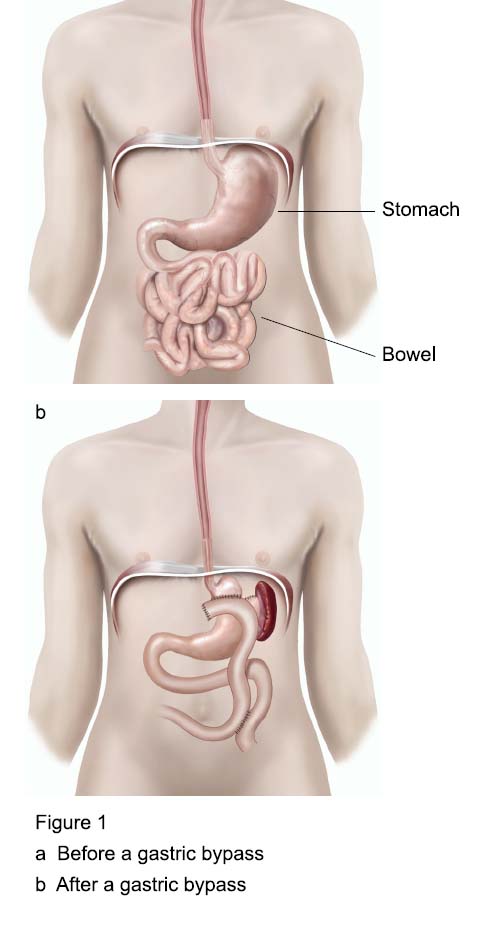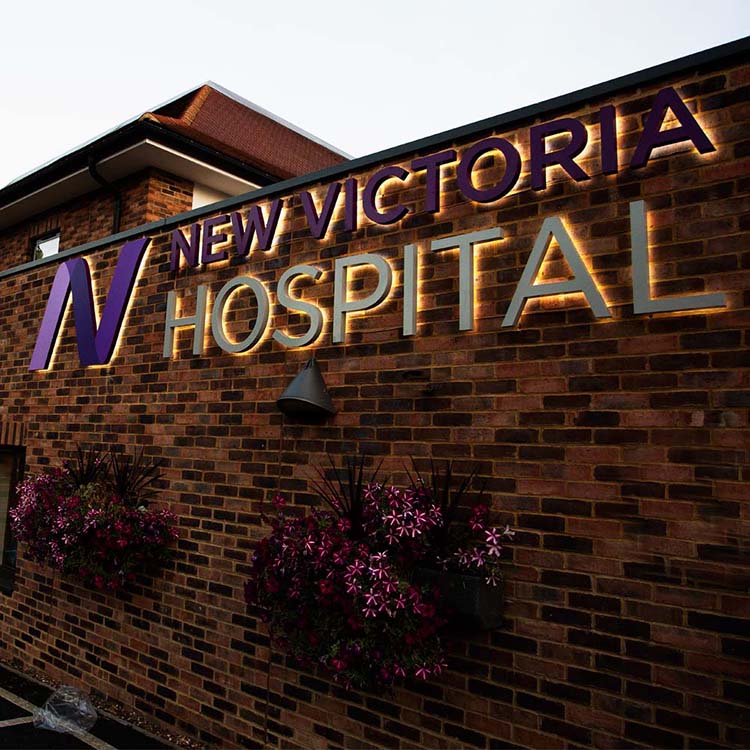What is a Gastric Bypass?
A gastric bypass (also called Roux-en-Y) involves stapling your stomach to create a smaller stomach ‘pouch’ and then bypassing the rest of your stomach and part of your bowel. It works by making you feel full sooner so that you eat less, and by preventing some of the calories and nutrients in your food from being absorbed.

Is a Gastric Bypass Suitable For Me?
If your BMI score is over 40 (morbid obesity), surgery may help you to achieve long-term weight loss. Surgery may also help if you have a BMI over 35 (severe obesity) and have other medical problems such as Type 2 diabetes, high blood pressure, sleep apnoea (your breathing stops for 10 seconds or longer during sleep), breathing problems or heart disease.
What are the Benefits of Surgery?
You should be able to achieve long-term weight loss but this depends on your ability to keep to your new lifestyle. Long-term weight loss should improve most obesity-related health problems you may have.
Are There Any Alternatives to a Gastric Bypass?
The simple approach to losing weight involves eating less, improving your diet and doing more exercise. Sometimes medication given by your GP can help.
There are other surgical options to a gastric bypass:
- Gastric banding
- Shortening your digestive tract
- Sleeve gastrectomy
It may be possible to have a gastric balloon, where an inflatable silicone balloon is inserted in your stomach to make you feel full sooner so that you eat less.
The Procedure
What Does the Operation Involve?
The weight-loss operation is performed under a general anaesthetic and usually takes 2 to 4 hours. Your surgeon will make a small cut on your abdomen so they can insert an instrument in your abdominal cavity to inflate it with gas (carbon dioxide). They will make several small cuts on your abdomen so they can insert tubes (ports) into your abdomen. Your surgeon will insert surgical instruments through the ports along with a telescope so they can see inside your abdomen and perform the operation.
Your surgeon will create a tunnel behind your stomach, just below the join with your oesophagus (gullet). They will pass a stapling device through the tunnel and then staple your stomach to create a smaller stomach pouch.
Your surgeon will use another stapling device to divide your small bowel about 120 centimetres below your stomach. They will bring up the lower end (enteric limb) and attach it using staples or stitches to your new stomach pouch. The contents of your new stomach pouch will now bypass the rest of your stomach and the first part of your small bowel.
What Complications Can Happen?
General Complications of any Operation
- Pain
- Bleeding
- Infection of the surgical site (wound)
- Unsightly scarring of your skin
- Blood clot in your leg
- Blood clot in your lung
- Developing a hernia
Specific Complications of This Operation
Keyhole Surgery Complications
- Developing a hernia near one of the cuts used to insert the ports
- Damage to structures such as your bowel, bladder or blood vessels
- Surgical emphysema (crackling sensation in your skin caused by trapped carbon dioxide gas)
Gastric Bypass Complications
- Pouch stenosis, where the join between the new stomach pouch and small bowel tightens
- Staple-line bleeding
- Anastomotic leak
- Developing a hernia inside your abdomen
- Death
Long-term Problems
- Change in bowel habit or diarrhoea
- Nutritional deficiencies
- Anastomotic ulcer
- Developing gallstones

Following Surgery
How Soon Will I Recover?
You should be able to go home the next day. You will be able to take only liquids for a few weeks, progressing to soft food and then, after 4 to 6 weeks, to solid food. You should be able to return to work after 2 to 4 weeks, depending on how much surgery you need and your type of work. Do not lift anything heavy for a few weeks. Regular exercise should help you to return to normal activities as soon as possible. You should be able to start exercising again after a week.Before you start exercising, ask the healthcare team or your GP for advice. On average, people who have a gastric bypass lose over half their excess body weight (the difference between their weight before the operation and their healthy weight).

Summary
If you are severely or morbidly obese, you have a higher risk of developing serious medical problems. If a simple approach involving eating less, improving your diet and doing more exercise does not work, a gastric bypass may help you to achieve long-term weight loss. Keep this information document. Use it to help you if you need to talk to the healthcare team.
If you would like to receive more information on a Private Gastric Bypass procedure at New Victoria Hospital, call us on 020 8949 9020 or fill in our online form.
Acknowledgements
Author: Mr Ian Beckingham DM FRCS
Illustrator: Medical Illustration Copyright © Medical-Artist.com
This document is intended for information purposes only and should not replace advice that your relevant healthcare team would give you.
The operation and treatment information on this website is published under license by New Victoria Hospital from EIDO Healthcare UK and is protected by copyright laws. Other than for your personal, non-commercial use, you may not copy, print out, download or otherwise reproduce any of the information.

Consultants and Clinic Times

Professor Marcus Reddy
Specialities
Related Specialities
Bariatric Surgery/Weight Loss Surgery
Bariatric surgery is a term for several surgical procedures to aid in the treatment of unhealthy weight gain and obesity. At New Victoria Hospital, through a selection of surgical treatment plans, our…









